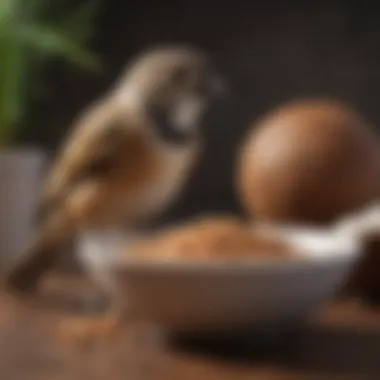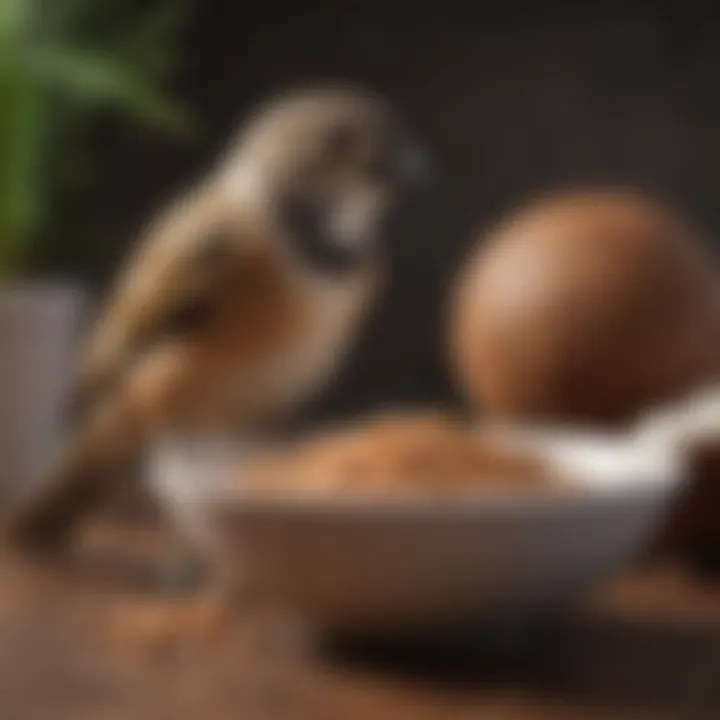Can Pet Birds Safely Enjoy Coconut Oil in Their Diet?


Intro
Coconut oil has made its mark in the culinary world, leaving many pet owners pondering its benefits for their feathered companions. It’s no wonder that many bird enthusiasts are curious about whether coconut oil can be a safe addition to their pets’ diets. With its potential nutritional properties and the promise of health benefits, it’s essential to approach this topic with care. Unlike dogs and cats, birds have specific dietary needs that can vary widely among different species. Thus, understanding how and if coconut oil fits into your bird's feeding plan requires some nuance.
Feeding pet birds is not merely about tossing seeds into a bowl; it's a balance, much like walking a tightrope. In this guide, we’ll navigate the factors that shape avian nutrition, examining not just the pros and cons of coconut oil but also what it means for the overall well-being of your avian friend. From discussing veterinary insights to exploring alternative oils and cornering best preparation practices, this comprehensive overview aims to serve pet bird owners, aspiring bird parents, and bird breeders alike.
Care Tips
Taking care of a pet bird goes far beyond just providing food. It involves a consistent daily routine that ensures they receive the nurturing they need. Here are some essential tips to keep in mind:
Daily Care Routines
A well-structured daily routine helps your bird feel secure and cared for.
- Feeding at Regular Intervals: Ensure that feed is given at the same times each day. Varied diets foster a healthy appetite.
- Social Interaction: Spend quality time with your pet. Talking, singing, or even just being nearby creates a positive emotional environment.
- Monitoring Activity Levels: Observing daily movements and play can help catch any behavioral changes early on.
Cage Setup and Maintenance
The cage is more than just a home for your bird; it’s a vital aspect of their health and happiness.
- Space Requirements: Different species have varying space needs. A general rule is that the larger the bird, the larger the cage.
- Perches and Toys: Variety is crucial. Place different types of perches and toys to encourage natural behaviors.
- Cleaning Schedule: Regular cleaning, preferably every few days, prevents the buildup of bacteria and keeps your bird healthy.
Hygiene and Cleaning Practices
Maintaining cleanliness in a bird’s environment promotes health.
- Daily Spot Cleaning: Remove uneaten food and droppings to keep the environment fresh.
- Weekly Deep Cleans: Wash toys, perches, and flooring with bird-safe cleaners.
- Bathing Options: Consider giving your bird a gentle shower or bowl for bathing; it can promote feather health too.
Seasonal Care Adjustments
Bird care can shift with the seasons.
- Winter Precautions: Make sure the home is warm enough, as birds can be sensitive to the cold.
- Summer Ventilation: Ensure good airflow during hot weather to prevent overheating.
Behavioral Insights
Understanding your pet's body language and behaviors can transform the bond you share.
Understanding Bird Body Language
Birds communicate a lot through their body language. For instance, raised feathers can indicate excitement or fear, while a relaxed posture signifies comfort. Learning these cues helps strengthen your relationship.
Common Behavioral Issues and Solutions
- Nervousness: If your bird is anxious, try introducing familiar toys or items.
- Boredom: Birds can get bored easily. Rotate toys and introduce new ones regularly to stimulate their minds.
Positive Reinforcement Techniques
Whenever your bird performs a desired behavior, reward them with a small treat or praise. This builds trust and encourages them to repeat those behaviors.
Social Interaction Needs
Like any pet, birds thrive on social interaction. Spending time with your bird helps fulfill their need for companionship. This is particularly important for species like parrots that are highly social.
Nutrition Guides
When venturing into avian diets, it’s imperative to comprehend the fundamentals. Here's what you need to know:
Essential Diet Components
A balanced diet should consist of:
- Pellets: Provide the primary source of nutrition.
- Fruits and Vegetables: Fresh, avian-safe produce is crucial.
- Seeds: While tasty, these should be an occasional treat, not the staple.
Safe and Toxic Foods
Knowing which foods are safe is critical:
- Safe: Apples, broccoli, and carrots.
- Toxic: Avocado, chocolate, and caffeine. Always research before introducing anything new.
Supplements and Treats
Natural treats such as nuts can be beneficial, but they should be given in moderation. Supplements might be necessary for certain species, particularly those with dietary restrictions.
Feeding Strategies for Different Species
Different birds have unique nutritional needs:
- Parrots: Require a mix of seeds, pellets, and fresh foods.
- Canaries: Thrive on seeds but benefit from veggies too.
Wellness and Health


Ensuring your bird's health is paramount for their happiness.
Routine Health Checkups
Regular check-ups with an avian vet can preempt health issues. Ensure your bird is examined at least once a year.
Identifying Symptoms of Illness
Watch for signs like lethargy, changes in appetite, or abnormal droppings — early detection is key to successful treatment.
Preventative Care and Vaccinations
Stay informed about vaccinations that may be necessary to prevent diseases common to pet birds.
Mental and Emotional Well-being
A happy bird is a healthy bird. Providing mental stimulation through play and interaction reduces stress and improves longevity.
Enriching Activities
Engaging activities keep your bird active and entertained.
Toys and Playtime Ideas
Provide different types of toys, including foraging toys that stimulate their natural instincts. Rotate these often to keep them fresh.
Training and Tricks
Birds are intelligent creatures. Teaching them simple tricks not only bonds you closer but also ensures they remain mentally agile.
Outdoor Activities and Interaction
If safe, allow your bird supervised time outdoors to expand their horizons. A simple stroll in a harness can be great fun.
DIY Projects for Mental Stimulation
Crafting simple toys from household materials can keep both you and your bird engaged. Cardboard boxes and paper towel rolls can transform into fantastic playthings.
“Dietary needs differ among bird species; understanding them can prevent overwhelming health issues.”
Navigating the ins and outs of avian care is no small feat, particularly when considering integrating new elements like coconut oil into their diet. It requires patience, research, and an understanding of individual needs. As you digest the information, remember that informed choices pave the way for a well-rounded and fulfilling life for your feathery companions.
Understanding Avian Nutrition
In the realm of pet bird care, understanding avian nutrition is paramount. Birds, like other pets, require specific nutrients to thrive; however, their dietary needs can differ greatly based on species. This eclectic mix of requirements can appear bewildering at first, but grasping these essentials helps in navigating the complexities of avian health and wellbeing. One of the most critical aspects of avian nutrition is recognizing the various food types available and how they contribute to a bird's overall health.
Fundamentals of Bird Diets
At the core of bird diets lies a spectrum of food types, ranging from seeds and pellets to fruits and vegetables. Each of these sources provides unique nutrients that birds need to maintain strong muscles, vibrant feathers, and optimal organ function. Notably, wild birds consume a varied diet that includes seeds, nuts, berries, and even insects, illustrating the need for a diverse feeding approach in captivity.
For instance, seed mixtures, while popular among bird owners, often lack some vital vitamins and minerals. When birds get too much of one kind of seed, it can lead to deficiencies or imbalances. Understanding these fundamentals can prevent issues like obesity or malnutrition, offering insights into how to mix things up to ensure well-rounded nutrition.
Importance of Balanced Nutrition for Birds
Balanced nutrition goes beyond merely filling a bowl with food. Just as humans need a mix of carbohydrates, proteins, fats, vitamins, and minerals, birds flourish on a well-rounded diet. This balance is key to nurturing vitality and longevity in pet birds. Factors like age, species, and activity level influence the specific dietary requirements; therefore, what works for a lively parakeet might not suit a more sedentary cockatoo.
Moreover, a balanced diet plays a pivotal role in various physiological processes. For example, a rich source of calcium is crucial for female birds, particularly during breeding seasons, to prevent eggshell issues. Likewise, antioxidants found in fresh fruits can protect against disease and bolster the immune system. Integrating diverse food options not only keeps birds physically healthy but also stimulates their natural foraging behaviours, which is essential for psychological wellbeing.
Coconut Oil Overview
Coconut oil has become quite a buzzword in the pet care community, particularly among bird owners. It's not just a trend; its unique properties and potential benefits have sparked genuine interest in how it fits into the diets of our feathered friends. Understanding coconut oil is crucial for those looking to enrich their birds' nutrition in a safe and informed manner.
Composition of Coconut Oil
Coconut oil primarily consists of saturated fats, with a good chunk being medium-chain triglycerides (MCTs). MCTs are praised for their quick absorption and conversion into energy in the body, potentially providing a sudden boost for active birds.
The oil also contains lauric acid, which is known for its antimicrobial properties. However, beyond fats, it’s good to note that coconut oil doesn't carry significant amounts of vitamins or minerals. This lack means it shouldn't be a sole dietary component but perhaps an addition to a more varied diet.
Nutritional Benefits for Birds
Including coconut oil in a pet bird’s diet may present several advantages:
- Energy Source: As energy levels are key for active birds, the MCTs in coconut oil can be beneficial. When consumed, they may be readily available for quick energy, making it easier for birds to maintain their energy throughout the day.
- Feather Maintenance: Some anecdotal evidence suggests that a small amount of coconut oil can promote better feather quality. Birds might consume oil when preening, leading to healthier, shinier plumage.
- Digestive Aid: Coconut oil can act as a lubricant for the digestive system, potentially easing the passage of food through the intestines.
Many bird owners report noticeable improvements in feather quality after including coconut oil in their birds' diets, although scientific backing is still limited.
Common Misconceptions about Coconut Oil
Despite its popularity, there are misconceptions that can cloud the judgment of well-meaning bird owners. Some common myths include:
- Coconut Oil is a Complete Dietary Substitute
It’s important to remember that coconut oil should not substitute other main food sources. Birds need a balanced diet, rich in fruits, vegetables, and grains. Coconut oil is a supplementary fat, not a replacement. - All Birds Can Benefit the Same
Different bird species have varying dietary needs. A small budgie may react differently to coconut oil compared to, say, a cockatoo. Always consult with a vet to ensure it suits your specific bird. - More is Better
A common misstep is assuming that larger amounts will yield greater benefits. Just like humans, birds can gain excess weight and have health concerns if they consume too much fat. Moderation is the name of the game.
It's crucial for pet owners to sift through information, ensuring that the choices they make are not only beneficial but also safe for their beloved birds.


Health Benefits of Coconut Oil for Pet Birds
The topic of coconut oil's health benefits for pet birds is crucial in understanding how to optimize the well-being of our feathered friends. This oily substance, often found in kitchens, is being increasingly considered in avian nutrition discussions due to its myriad of potential advantages. When we bring coconut oil into the fold, it’s not simply about one aspect of health; rather, it’s about fostering overall vitality in birds. Below, we will dive into specific elements that highlight its benefits, alongside considerations to keep in mind.
Fostering Feather Quality
Coconut oil is often lauded for promoting beautiful and healthy feathers in birds. The high fat content, particularly from medium-chain triglycerides, can enhance feather structure and provide necessary hydration. When introduced carefully into a pet bird’s diet, coconut oil supports feather maintenance. It might act as a natural moisturizer, ensuring feathers remain glossy and less prone to brittleness.
In many cases, birds with poor plumage may benefit greatly from the inclusion of coconut oil. This could be particularly true for species like parrots, known for their vibrant feathers. Shiny and strong feathers not only improve a bird’s appearance but also act as a barrier against external threats, such as parasites and infections. However, moderation is key—overindulgence in any oil can lead to excess weight, which might lead to its own set of challenges.
Potential Antimicrobial Properties
Another interesting aspect is the potential antimicrobial effects of coconut oil. Some studies suggest that coconut oil can possess certain antibacterial and antifungal properties, making it a candidate for helping combat mild infections. This property arises mainly from lauric acid, a component found in significant amounts in this oil. For instance, if a bird has minor skin irritations or is susceptible to fungal infections, incorporating a dash of coconut oil could aid in their recovery.
Still, one must tread carefully here. While these properties might benefit some birds, others can have adverse reactions. It’s wise to consult an avian veterinarian before relying on coconut oil as a treatment for any health issue. As always, a well-rounded diet is essential—coconut oil should just be a small part of the bigger picture.
Influence on Digestion
Coconut oil may also play a role in improving digestive health for pet birds. Some bird owners have reported that including this oil in diets can help with nutrient absorption and promote a healthier gut flora. The trouble with digestive health is that many birds face challenges, especially when dealing with seed-based diets that are often not completely digestible.
Using coconut oil can enable birds to better process their food, enhancing overall nutrient uptake. It might be particularly helpful for older birds or those recovering from illness. When your feathered companion has an easier time digesting its food, you might witness better energy levels and overall vitality. Just remember, balance in their diet remains important; coconut oil should complement, not dominate, a bird's meals.
Judicious Use of Coconut Oil in Bird Diets
The discussion surrounding the inclusion of coconut oil in the diets of pet birds isn’t just a matter of what is trendy or currently popular. It digs deep into the health and well-being of our feathered friends. Coconut oil can provide certain benefits, but like any addition to a diet, it requires careful consideration. This section highlights the importance of moderation and balance, ensuring that the integration of coconut oil is done wisely to complement the overall nutrition of the birds.
Recommended Serving Sizes
When it comes to serving sizes, a general rule of thumb applies: less is more. Birds, particularly smaller species, have unique metabolic rates that can be affected by excess fat in their diet. A good starting point is to offer 1/4 to 1/2 teaspoon of coconut oil per bird per week. Larger birds may manage a small increase, but this should be assessed on a case-by-case basis. Introduction can begin at the lower end of this range, observing how a bird responds. Adjustments can then be made according to the individual bird's health, activity level, and overall diet.
Here are a few considerations to keep in mind when determining servings:
- Species Variation: Different birds have different dietary needs. Parrots, for instance, may tolerate higher fat content compared to finches.
- Health Conditions: A bird with existing health problems should have its diet tailored to its needs. Consultation with a veterinarian is wise here.
- Behavioral Observations: Noting any changes in behavior or health after introduction will guide future decisions.
Mixing Coconut Oil with Other Foods
Integrating coconut oil into the diet doesn't mean you have to serve it alone. Mixing it with other foods can enhance its palatability and nutritional profile. A popular approach is to combine coconut oil with healthy fruits and vegetables. For example, dolloping some on steamed sweet potatoes or mixing it into a fruit mash can be delightful for birds and encourages them to consume more nutrients.
Moreover, consider the following tips:
- Heat Sensitivity: As coconut oil has a low smoke point, it’s best not to apply it to hot foods. Instead, it’s advisable to mix it in once the food has cooled off to retain its beneficial properties.
- Variety in Diet: Use coconut oil as one component in a mixed diet. This could mean pairing it with seeds, nuts, or even a commercial bird-safe pellet.
- Flavor Enhancement: A little coconut oil can make dry foods more appealing and can even be used in cooking bird-safe treats.
Risks and Concerns with Coconut Oil
As intriguing as coconut oil may be for its potential benefits for pet birds, a comprehensive understanding of the associated risks and concerns is equally pivotal. Not every food that’s hailed as healthy for humans translates well to our avian companions. It's essential for bird owners to remain vigilant and understand the nuances before incorporating coconut oil into their pets' diets.
Potential Adverse Reactions
Just like people, birds can have varied reactions to different foods. While many birds might tolerate coconut oil without issue, some might experience adverse reactions. Symptoms could range from mild digestive upset to more serious health issues. It's not uncommon for sensitive birds to show signs of distress when introduced to an unfamiliar food item like coconut oil.
In some cases, birds can exhibit:
- Diarrhea: A sudden change in diet could lead to an upset stomach.
- Vomiting: This could indicate that the bird's system isn't coping well with the new addition.
- Allergic Reactions: Though rare, there are instances where birds might experience allergies, leading to skin irritations or breathing difficulties.
Being aware of these potential reactions is vital for any responsible bird owner. Always introduce coconut oil slowly into a bird's diet and observe them closely for any unusual behaviors. If a bird displays concerning symptoms, consult a veterinarian promptly.
Coconut Oil and Dietary Imbalance
While coconut oil has its share of benefits, moderation is the name of the game. One of the major issues that arises with its use is the potential for dietary imbalance. Birds thrive on specific nutrients, and over-reliance on any one food can hinder their overall health.
Coconut oil is high in saturated fats. If it's not carefully managed in conjunction with a balanced diet, it could lead to:
- Excess Weight Gain: Birds, particularly within enclosed environments, are prone to obesity. The additional calories from coconut oil can accumulate quickly.
- Nutritional Deficiencies: Relying heavily on coconut oil could mean skimping on other essential nutrients necessary for a bird's health. A diet lacking in variety may not provide the necessary vitamins and minerals.
To prevent these issues, it's best to treat coconut oil as a supplement rather than a staple. Combine it with a wide-ranging diet of seeds, fruits, and vegetables, ensuring that the bird receives a balanced intake.
"Over-indulgence could be more harmful than beneficial; moderation is key when considering coconut oil for your feathered friend."
In summary, understanding the potential risks surrounding coconut oil is crucial for bird owners. An informed approach not only guides dietary choices but also promotes overall well-being for our beloved pets.
Comparison with Other Oils for Birds
When discussing the dietary options for pet birds, it is essential to consider not only coconut oil but also various other oils that could be beneficial or harmful. This section compares different oils, focusing on their nutritional content, benefits, and considerations for our feathered friends. Understanding the broader landscape of oils can help pet bird owners make more informed choices about what to include in their birds' diets.
Olive Oil: Pros and Cons
Olive oil has been a staple in many kitchens, prized for its flavor and health benefits for humans. For birds, it can be a valuable addition, too, provided it is used correctly.
Pros:
- High in Monounsaturated Fats: Olive oil contains healthy fats that promote heart health, which could benefit birds by supporting overall wellness.
- Antioxidant Properties: Rich in antioxidants, olive oil can help combat oxidative stress and might help in supporting a bird's immune system.
- Versatile Usage: It can be drizzled over veggies or mixed into their feed, making it easy to incorporate into your pet's meals.
Cons:


- Caloric Density: Like coconut oil, olive oil is calorie-rich; too much could lead to unhealthy weight gain in birds, which is a common concern among avian owners.
- Potential for Allergies: Some birds may have a sensitivity to olive oil, leading to gastrointestinal upset. Always monitor your bird's response when introducing new foods.
Flaxseed Oil: Nutritional Insights
Flaxseed oil deserves attention as it contains omega-3 fatty acids, essential for bird health. These fatty acids are vital in supporting brain function and a healthy coat of feathers.
Nutritional Insights:
- Omega-3 Fatty Acids: Critical for healthy skin and feathers, omega-3s can offer plenty of benefits for your feathered companion.
- Aids in Digestion: Flaxseed oil may help in smoothing the digestive tract; thus, it can be a practical addition during molting or stress periods.
Considerations:
- Storage Issues: Flaxseed oil can easily become rancid; it’s crucial to store it properly, away from light, and use it quickly to avoid spoilage.
- Potential for Overconsumption: Again, moderation is key to avoid any digestive distress or imbalance in the bird's nutritional intake.
Other Oils and Their Validity for Avian Diet
There are numerous other oils that bird owners might consider. Each has its merits and drawbacks. Here’s a glance at a few more:
- Canola Oil: Low in saturated fats and rich in omega-6, canola oil can be suitable in moderation. However, it must be balanced with omega-3 sources to avoid dietary imbalance.
- Pumpkin Seed Oil: This oil is nutrient-dense and provides proteins and essential fatty acids. It's also known for promoting urinary health.
- Hemp Seed Oil: Another great omega-rich option, hemp oil contains various essential nutrients and has anti-inflammatory properties.
Despite the benefits of these various oils, pet bird owners should exercise caution. Always introduce oils gradually and in specific, measured amounts. Every bird has its own unique responses to dietary changes, so be sure to keep an eye on how your companion reacts.
Remember: It's often a balancing act when incorporating oils into your bird's diet. The goal is to enhance their life quality without tipping them over the edge into health complications.
By exploring the pros and cons of different oils, bird owners can better navigate the complexities of avian nutrition.
Veterinary Perspectives on Coconut Oil
Understanding how coconut oil fits into a pet bird's diet requires insight from those who specialize in avian health. Veterinary perspectives are vital not just for providing clarity, but for ensuring the safety and wellbeing of our feathered companions. By exploring the opinions of avian veterinarians, we can unravel the layers surrounding coconut oil, its potential benefits, and its drawbacks.
Insights from Avian Veterinarians
Avian veterinarians often highlight the importance of a balanced diet for birds, which includes a variety of foods rich in vitamins and minerals. When it comes to coconut oil, opinions can vary. Some veterinarians endorse its use due to its potential benefits, such as improving feather condition and skin health. They note that the medium-chain fatty acids in coconut oil may offer a source of energy that can be particularly beneficial for active birds.
However, not every bird requires the same diet. The unique nutritional needs of each species must always be considered. For example, some birds may thrive on a diet that is predominantly seed-based, while others will benefit from a higher inclusion of fruits and vegetables. Veterinarians stress that it's crucial to introduce coconut oil cautiously, monitoring birds' reactions to it closely.
"When adding new foods like coconut oil to a bird's diet, always start small. Just like introducing a new pet, birds need time to adjust. A watchful eye can prevent unwanted surprises."
Case Studies: Coconut Oil in Bird Care
To gain a holistic view of coconut oil’s implications, case studies shed light on real-world applications. Several anecdotes from veterinary clinics provide evidence of positive outcomes from introducing coconut oil to avian diets. For instance, one case involved a parakeet that struggled with feather plucking. After integrating a slight amount of coconut oil into its diet, the owner observed an improvement in feather texture and a reduction in plucking behavior.
In another instance, a veterinarian reported a cockatoo with recurrent skin irritations. After advising the owner to use coconut oil as a topical treatment, the skin began to heal effectively, showcasing coconut oil's versatility. Most importantly, these case studies underline the necessity of professional guidance. In both examples, the veterinarians played a crucial role in assessing the bird's health and making tailored recommendations.
Moreover, it’s essential to note that while positive outcomes can occur, not all birds react favorably to coconut oil. Therefore, veterinarians encourage pet bird owners to consult with a knowledgeable avian veterinarian before making significant changes to their bird's diet.
By comprehensively examining veterinary insight and real-world scenarios, bird owners can make informed decisions, ensuring their pets receive the optimal nutrition they need.
Practical Guidelines for Pet Bird Owners
When considering the inclusion of coconut oil in your pet bird's diet, it’s crucial to proceed with a well-informed approach. The principles laid out in this section provide a practical framework, ensuring that bird owners make educated decisions that promote their feathered friends’ health and wellbeing.
Understanding functionality in avian nutrition is an important aspect for any bird owner. Coconut oil, while having its perks, isn’t a one-size-fits-all solution. Different species of birds come with unique dietary requirements, so incorporating any new ingredient must carefully take those into account. Here are some key points to remember:
- Research and Understand Your Bird's Species: Different birds have differing needs. For example, while a macaw might appreciate a bit of coconut oil in their diet, a finch might not require the same fats.
- Consult a Veterinarian: Before altering your bird’s diet in any significant way, a chat with an avian vet can be invaluable. They can provide tailored advice based on your bird's specific health conditions and dietary habits.
- Start Small: When introducing coconut oil, beginning with a small amount is wise. This allows you to monitor your bird's reaction and avoid potential adverse effects.
Introducing Coconut Oil to Your Bird
Introducing coconut oil into your bird's meals need not be complicated, but it does require a measured approach. For starters, ensure you have high-quality, organic coconut oil. The refinement process can strip out vital nutrients; thus, extra virgin coconut oil is often considered a healthier choice.
- Gradual Introduction: Mix a tiny amount of coconut oil with your bird's favorite treat—this could be their seed mix or a fresh piece of fruit.
- Observe Reactions: After introducing it, watch for any distress signs, like changes in behavior or digestion. If all is well, you may slowly increase the amount over time.
- Pair with Other Foods: Consider combining the oil with other healthy options, such as vegetables or whole grains, which can enhance the flavor and overall nutrition.
Monitoring Your Bird’s Response
Once you've started incorporating coconut oil, vigilance is key. All birds react differently, so keep a close eye on them.
- Behavioral Changes: Is your bird more active? Less energetic? Changes in their behavior could be a sign of how they are processing the coconut oil.
- Physical Signs: Health indicators like feathers condition should be noted. Shiny, healthy feathers might suggest that the coconut oil is working well, whilst dull or flaky feathers could signal too much oil or lack of other essential nutrients.
It’s important to remain adaptable and responsive to your bird’s needs. Monitoring how they react can guide you to the best practices in using coconut oil.
- Consult Regularly: If there are any concerns or noticeable changes, a quick consultation with your avian vet is always a safe avenue, ensuring you have expert advice when navigating dietary additions like coconut oil.
By laying out practical guidelines in introducing and monitoring coconut oil, pet bird owners can enhance their understanding of their birds’ needs while promoting a balanced nutrition plan.
Finale
In this article, we've untangled the webs surrounding the topic of coconut oil and its role in the diets of pet birds. Coupled with a solid understanding of avian nutrition, the inclusion of coconut oil can bring several benefits. However, it’s crucial to weigh the positives against the possible downsides, highlighting the need for responsible integration into their diet.
Summary of Key Points
- Nutritional Value: Coconut oil contains medium-chain fatty acids, which may offer energy without excessive weight gain. Its potential for improving feather quality proves significant for many bird breeds.
- Health Benefits: The oil's antimicrobial properties can help fend off some infections, while its influence on digestion may support gut health for birds.
- Risks and Precautions: As with any dietary changes, the introduction of coconut oil should be done gradually. Some birds may exhibit adverse reactions, so monitoring is key. Furthermore, too much coconut oil can lead to an imbalance in their overall diet.
- Veterinary Insights: Recommendations from avian veterinarians often underscore that while coconut oil can be beneficial, each bird is unique, necessitating tailored advice based on individual birds' needs.
Final Thoughts on Coconut Oil for Birds
Coconut oil presents an intriguing option for pet bird owners looking to enhance their birds’ diets. It is not a one-size-fits-all solution, nor should it replace balanced nutrition that birds require. Instead, it can serve as a supplementary food source, provided it’s introduced carefully.
In essence, informed decision-making is essential. As a bird owner or aspiring caretaker, consider consulting your avian vet before making any major changes. Doing so will ensure that your feathered friends thrive in an environment conducive to their health. The road to optimal bird care involves blending knowledge with intuition, nurturing your bond with your pet while promoting their overall well-being.
"Birds are not just pets, they are companions that depend on our understanding and care for their health. A little tweak here or there in their diet can make a world of difference."















